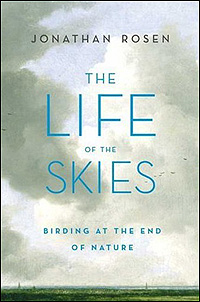Last night I started reading Jonathan Rosen's The Life of the Skies: Birding at the End of Nature and my eyes were nearly impossible to keep open and burning before I finally put it down for the night...so good so far. It is also the second book that I have recently read that mentions E.O. Wilson's Biophilia (a recent read), which is kinda neat..I love when that happens.
I think non-birders would really like this book also...

Excerpt from the PROLOGUE:
Everyone is a birdwatcher, but there are two kinds of birdwatchers: those who know what they are and those who haven't yet realized it. In the United States, a lot of people have realized it — 47.8 million Americans, according to the Fish and Wildlife Service — and yet my passion is constantly greeted with surprise. You? Perhaps it is because I live in a city and lead an urban life. But why should people wonder that I watch birds? It's like being surprised that someone has sex or goes to the bathroom. The surprise reveals ignorance not so much about birds—their beauty, their abundance, their wild allure — as about human nature. We need, as the great biologist Edward O. Wilson has argued, to affiliate with nature in order to be happy. He calls this phenomenon "biophilia."
The urge to watch birds is all but instinctive, dating, no doubt, from a time when knowing the natural world — what could be eaten and what could eat us, what would heal us and what would bring death — was essential. It is fed by our urge to know, as strong as our urge to eat. Could you imagine a lion stalking prey not out of hunger but out of curiosity? We name things, we classify them. In the Bible Adam gives names to the natural world, imposing a human order on a chaos of life, a kind of second creation.
Birdwatching is as human an activity as there can be. We have one foot in the animal kingdom — where, biologically, we belong — but one foot in a kingdom of our own devising. As Walt Whitman said of himself, we are "both in and out of the game / and watching and wondering at it."
As it turns out, living in a city and watching birds is hardly a contradiction. Modern birdwatching is virtually an urban invention. Institutions of higher learning where bird skins were available, not to mention collection curators who brought their indoor learning outdoors, were virtual prerequisites as birdwatching came of age.
To be bored with London is to be bored with life, said Dr. Johnson. I live in New York City, a metropolis greater than Johnson's London, and I feel the same way about my city — but I feel this way partly because it was in New York City that I discovered birds. More and more I realize that to be bored with birds is to be bored with life. I say birds rather than some generic "nature," because birds are what remain to us. Yes, deer and coyotes show up in the suburbs, you can see grizzlies in Yellowstone Park, and certainly there are bugs galore. But in Central Park, two blocks from my apartment, hundreds of species of birds pass through by the thousands every spring and fall, following ancient migratory routes as old as the Ice Age.
Read the rest (+ article) HERE
-Read a book review from Living Bird HERE.
...












































No comments:
Post a Comment